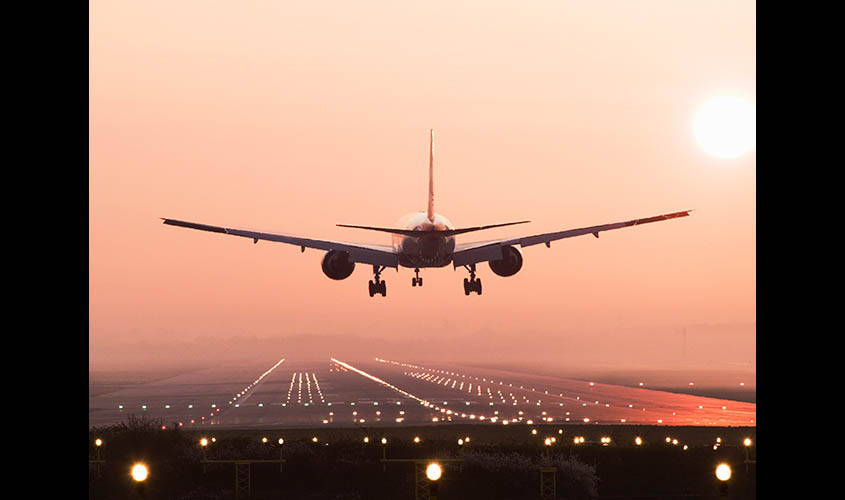Industry experts say limiting number of flights may increase average fares.
Mumbai, the country’s financial capital, is facing acute congestion in its airspace due to heavy load of domestic airlines as well as private jets of the corporate world’s big shots. So alarming is the choking of the Maximum City’s airport runway that the Ministry of Civil Aviation has had to step in and ask airlines to reduce their flight operations as the current situation is forcing planes to hover over the city for durations as long as 40-60 minutes.
“Considering that an aircraft on an average consumes 2,000 kg of fuel per hour, such long duration circling time causes significant wastage of fuel for aircraft ranging from 1.7 kilolitres of jet fuel (approx. cost, around Rs 1.8 lakh) for a 40-minute circling time in air, to around 2.5 kilolitres of jet fuel (approx. cost, around Rs 2.6 lakh) for a 60-minute circling time,” said the Ministry’s advisory which saw about 20 flights being cut by domestic airlines on Thursday.
“As per directives to ease congestion at Mumbai airport, there have been certain cancellations w.e.f. February 15, 2024. Affected passengers are being informed and being provided with options to either avail a full refund, travel to an alternate sector, or reschedule their flight. We regret the inconvenience caused to all our passengers,” IndiGo said in a statement.
While the ministry is determined to ease the runway congestion in Mumbai, industry experts said curtailment in the number of flights would jack up the average fares of flights to and from the Maximum City. Not just the common flyer but even the jet-set honchos may have to live with curbs imposed on the operations of private jets during peak hours.
“Considering safety and the overall passenger flying experience, it’s a welcome move. But this will definitely have an impact on the cost of tickets. We could see an upward revision for the Mumbai leg,” said Jagannarayan Padmanabhan, Senior Director, Crisil Market Intelligence. According to the ministry, in order to remedy such air space congestion, an analysis was conducted by Airports Authority of India, which found that air traffic permitted per hour during the 6 hours of High Intensity Runway Operations (HIRO, i.e. from 0800 hrs to 1100 hrs, and 1700 to 2000 hrs) was almost equivalent to air traffic permitted per hour during the remaining 18 hours of the day.
In addition to the above slots, general aviation and military aircraft operations were also allowed without any restrictions. Besides, owing to presence of transverse runways, operation of non-scheduled flights further increases air traffic congestion during peak hours. While Mumbai airport is running at its full capacity, it was found that the persistent congestion was caused due to excessive slot distribution with limited time margins on behalf of the airport operator, non-adherence of the slots on behalf of the airlines, and non-scheduled operations during peak hours.
The airport operator being the slot provider as well as the manager of slots to the airlines should have proactively taken steps to streamline and regulate the air traffic movements, to resolve this problem, the ministry said. However since no such action was initiated by them, the Ministry of Civil Aviation has had to step in. The Airports Authority of India, being the Air Navigation Service Provider, issued directives to the airport operator in the form of Notice to Air Men (NOTAMs) on 2 January 2024, which restricted the air traffic movements (ATM) during HIRO (i.e. from 0800 hrs to 1100 hrs, 1700 to 2000 hrs, and 2115 hrs to 2315 hrs) period from 46 to 44 per hour and in non-HIRO period from 44 to 42 period, the ministry said.
Further general aviation aircraft operations during HIRO period have also been restricted. It is expected that MIAL should take immediate action to ensure that all airlines are on board with the prescribed restrictions. This action has been taken in larger public interest from the perspective of airspace safety, efficiency of operations and passenger satisfaction, the ministry said. The ministry added that with the lifting of travel restrictions post pandemic, airports have witnessed a considerable increase in air traffic and airspace congestion, forcing planes to hover over the city.
“It is to be understood that such increase in fuel cost would eventually be borne by the consumers. This also has a cascading effect on the efficiency of airports operations leading to a longer wait time, inordinate delays, affecting both passengers and airlines adversely,” the ministry said.

